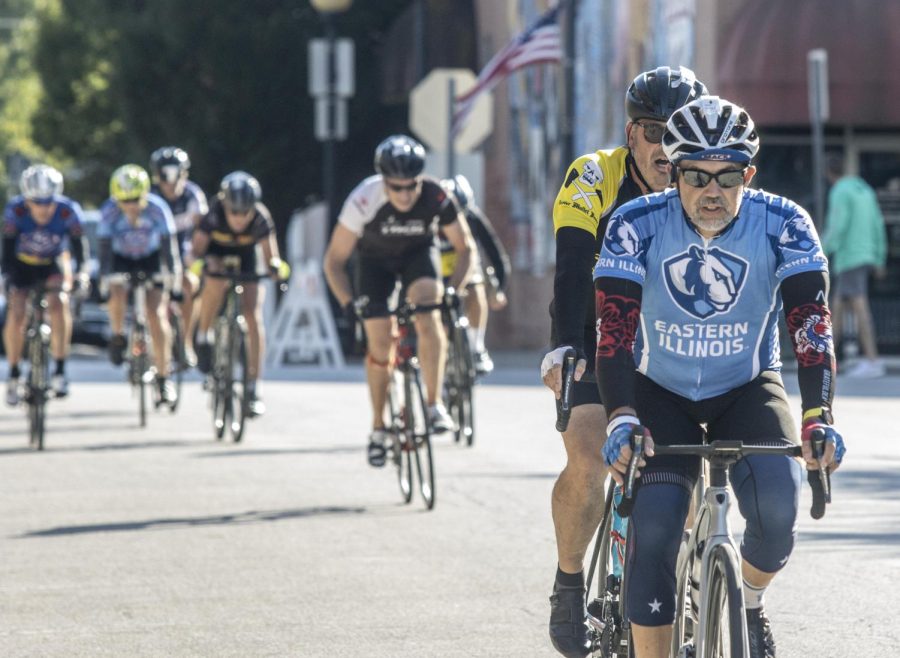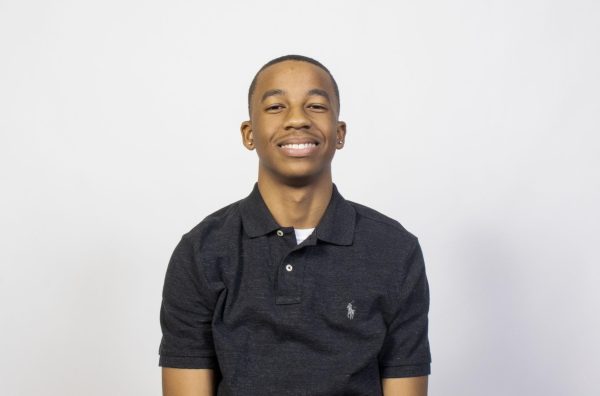Biology professor Rob Colombo hooked on fish ecology
Eastern biology faculty member Rob Colombo bikes towards the Tour De Charleston finish line Saturday morning in the Town Square.
January 25, 2023
The coordinator of environmental biology program and professor of fish ecology has been at Eastern for 14 years. Born and raised in New York, he developed a love for fishing when he was younger thanks to his grandfather.
However, he didn’t start off right away in his current field, but as an electrician before he attending community college at night, eventually leading to him attending State University in New York for environmental science and forestry and obtaining his bachelor’s degree.
While attending school, he met his wife and later moved to Chicago with her in 1998 to start working at the Shedd Aquarium as a fish pathologist, spending his time trying to figure out why fish die, and quarantine aquarist. After a conversation with a professor he met while working, he went back to school to earn a master’s and doctoral degrees.
After obtaining his doctorate, he taught for two years at the Southern Illinois University School of Medicine and eventually came to Eastern in 2009 and has been at the university ever since.
He describes his teaching style as out of the box.
“I use what’s called the Socratic method,” Colombo said. “I just ask students questions with the idea in mind that I’m going to move them towards this piece of information that they need to know. The reason I do that is I want them to realize that biology makes sense because it works.”
Combining his passion for fish and teaching, he has been able to do a number of things to advance studies in Eastern’s biology department. One way he does this is by him and coworkers being part of the Center for Fisheries and Aquatic Science on Eastern’s campus, and they go out and look for money to fund graduate students to do research throughout the state.
Colombo said they bring in about half a million dollars of external funding for different projects. The money is then divided into multiple areas; some of the funds then are used to help write grants and to fund graduate student tuitions and stipends.
An example of what the funding goes toward is a long-term project that looks at the community structure like in the Wabash River.
“We’ve been doing it for a decade,” Colombo said. “So, we go out and we use electricity because water doesn’t conduct electricity very well. But fish are like bags of salt in the water. So, when you turn on the electricity, the electricity wants to follow the path of least resistance. The fish is the path of least resistance, so the electricity go through the fish, and it shocks them, stuns them, and then they come to the surface, and we use dip nets to bring them into the boat and then we identify, weigh, and measure.”
They also look at other things about the fish, including finding out their age, by taking the pectoral spine. Another exhibit they are working on is in Kickapoo Creek, where students look at how restoration affects the fish assembly.
“We go out twice a year electrofishing to sample the fish [and] see if they’re changing in our restored areas compared to our non-restored areas,” Colombo said.
Colombo said they take students out on the boat to do the electrofishing too once a semester, but in another class, they go out and do it every other week. The first half of this class is lab work and the second half is field based.
He enjoys his time at Eastern and said he loves the students, that they are all hard working and do not feel entitled to things.
“[The students] make no excuse for when they don’t do well,” Colombo said. “They put it on themselves, which you don’t see at a lot of universities.”
Cam’ron Hardy can be reached at 581-2812 or at [email protected].




















































